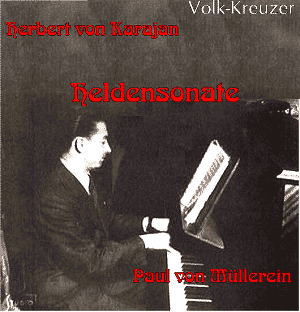Karajan’s deposition to the Austrian
denazification examining board in March 1946 outlines in some detail
his membership of the NSDAP and the problems he had after 1939 in becoming
a ‘representative "German conductor"’. It fails to mention
his single contribution as a composer – his 1938 Heldensonate
(Hero Sonata), a work which Karajan, a considerable pianist in his youth
(he began learning at the age of 3), and a frequent accompanist in his
later years, composed shortly after the German invasion of Austria,
and which he had originally titled Anschluß Sonate.
Its origins are less than honourable,
being in part down to his ambitious desire to ingratiate himself with
the Nazi hegemony which he saw as a surefooted way of developing his
own career within Germany. This was especially the case after a 1935
performance of Tristan which drew the ever-lasting wrath of Furtwängler
himself, but brought Karajan to the attention of Goebbels and Hitler.
Indeed, Karajan was one of only a few top-flight conductors to join
the Nazi Party – Schillings and Hausegger being even more pro-Nazi than
the Wünderkind – but at the time its benefits were considerable.
He was certainly held in higher regard than Knappertsbusch (‘a military
band leader’, according to Hitler) and Böhm (‘second-rate’ bellowed
the Führer) but Karajan’s world collapsed in 1939 following a gala
performance of Die Meistersinger in the presence of Hitler
and the Yugoslav prince regent at the Berlin State Opera. Stories as
to why the performance went wrong differ but Hitler had no doubt it
was because of Karajan’s practice of conducting from memory; ‘es
war zur Öffentlichkeit sowie die Sänger extrem unüberlegt’
(it was extremely inconsiderate to the public as well as the singers),
he reportedly said. It cost Karajan a job in Dresden that went instead
to Elmendorff.
It could be argued that Karajan’s
Heldensonate, which was performed in 1938 at one of the Wahnfried
receptions Hitler attended annually, had more to do with his alienation
than that epoch-defining performance of Meistersinger little
more than a year later. Hitler’s notorious indifference towards modern
music, and his view that ‘fate’ had not produced any worthwhile German
composers after Wagner, probably played a part in Karajan’s gradual
freezing from his earlier promise. It was certainly unwise of the young
Karajan to choose a heroic title for his work since Hitler was hopeful
that it might be on the same memorial scale, even though it was principally
a sonata, that Gottfried Müller’s Deutsches Heldenrequiem
(1934) had been.
The idea that Karajan’s sonata might
be a Zeitgemälde proved disappointing, not least because
if you hear this work it proves to be so obviously deficient in inventiveness
and sheer scale for the monumental events it is trying to depict, a
shattering blow to the German view of art as a symbol of Germany’s greater
thousand year reich. Prokofiev proved to be a much greater composer
at symbolising through the piano the great events that shaped the Russian
war during the early 1940s than any German composer of the same period.
There are no military marches, no declamatory chords shadowing the heavy-jackbooted
soldiers raping the Austrian landscape. In Karajan’s opening allegro
the mood is almost pastoral, more reflective of a Viennese sleepiness,
almost as if Karajan is drawing a peaceful arc over much greater events.
Perhaps the heroism is more Austrian than German, and it is perhaps
this which made Hitler feel so uncomfortable at the performance of the
work he attended. Indeed, Winifred Wagner noted in a letter to Goebbels
that Hitler seemed ‘almost induced to a comatose state by Herr Karajan’s
sonata’.
The central adagio is the
longest movement – at almost twenty minutes taking up half the sonatas
entire timing. It is indeed pedestrian with slowly evoked single chords
sparingly played between similarly sparse pauses. If it resembles in
its focus a requiem it is because Karajan occasionally gives an almost
hymnal quality to the lower bass chords of the piano part. The final
movement, at five minutes, is a waltz which whirls beautifully, if sometimes
over-controlled and over-mannered, to a joyous conclusion.
Karajan, a man not known for his
irony, may well have been making a point about his own Austrian ancestry.
The heroes he depicts through the understatement of the piano writing
are perhaps the Austrians themselves. Everything about the sonata suggests
life going on as normal, that even after invasion little can shatter
the determination of a people to be subjected to the imprisonment of
false ideals; there is certainly little to suggest that the title of
the work is a reference to the ‘heroic’ Germans, and much to suggest
otherwise.
The work’s poor reception at its
first hearing effectively shelved it from further performance and this
recording of it is the only one I know of. Paul von Müllerein’s
performance of it is extremely fine and detailed. Recorded last year,
but released propitiously last month, it seems ironic that a conductor
condemned for his nationalist sympathies has in fact been able to produce
a work that illuminates, with some integrity, a greater belief in the
rights of people who suffer at the hands of others.
Dietrich Zaum

